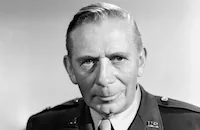Invitation

Brief Synopsis
Cast & Crew
Gottfried Reinhardt
Van Johnson
Dorothy Mcguire
Ruth Roman
Louis Calhern
Ray Collins
Film Details
Technical Specs

Synopsis
Fragile Ellen Pierce kisses her architect husband Dan goodbye as he leaves their Connecticut home for the office. Ellen, who is adored and pampered by her millionaire father, Simon Bowker, then goes to his Long Island estate. There she tells Bowker and his friend, Dr. Warren Pritchard, who is also her physician, that she recently passed out after feeling short of breath. Pritchard says that there may be a new treatment that could help, and Ellen leaves, hopeful that she soon can have a normal life with Dan. On the way home, Ellen stops by the cottage of family friend Dr. Redwick, with whose daughter Maud she was once close. Maud is bitter over Ellen's marriage to Dan, with whom she is in love, and tells Ellen that her year of having him "on loan" is almost over. Ellen feels more pity than anger at Maud, and leaves. When Ellen arrives home late, Dan is frantic and admonishes her for worrying him. That night, Ellen's thoughts drift back to a year before: At a party on the estate, Ellen chats with childhood friends Maud and Dan. While the others play tennis and swim, Ellen, who had rheumatic fever as a child, goes to rest. When Bowker comes to see her, she tells him not to worry about her because she is resigned to being plain and remaining a spinster. A few days later, at Bowker's office, she runs into Dan, who is just leaving. She offers him a lift to Long Island and during the ride, he abruptly kisses her "for luck." They begin seeing more of each other, and Dan tells her that he feels he never really knew her. One evening, he unexpectedly comes to her house and proposes. She is surprised, having thought that he loved Maud, but he assures her he never did. Ellen does not give an answer, but later, with her father's encouragement, decides to accept, sobbing that finally somebody loves her. At the wedding, an intoxicated Maud shows up late and tells Ellen that she only has Dan on loan for a year. Dan and Ellen embark on a European honeymoon, and several weeks later, while stopping to repair their car in Switzerland, Dan mistakenly thinks that Ellen has fallen over a cliff and panics. When he finds her a few seconds later, he holds her close and says that he was afraid he had lost her. A few days later, he brings noted European physician Dr. Fromm to see Ellen and tells her that he loves her more than he ever thought possible. The day after Ellen's reverie, she is puzzled to receive an invitation to a medical institute banquet for Dr. Toynberry, a mitral heart valve specialist. Curious, Ellen calls the institute and learns that the invitation was sent at the request of Maud, whose father is the vice-president. Now suspicious, Ellen looks at a medical dictionary and finds that mitral valve defects in young adults are usually fatal. Now Ellen realizes that everything in her idyllic past year has been a gift from her father. She calls him and hysterically says that she wants to die, but thanks him for the lovely year. When Dan returns home that evening, Ellen greets him coldly, and Bowker calls to tell him that Ellen has guessed about their bargain. He is on his way to their house and begs Dan to convince Ellen she is wrong. After the phone call, Dan is distraught, especially when he sees the invitation on the desk. He then goes in to Ellen and says that Toynberry has had some success with mitral heart valve operations but they kept the news from her so her hopes would not be raised. He then admits everything and asks her to listen to his story: Dan is summoned to Bowker's office and told that Ellen only has a year to live, but does not know. Dan, who has always been fond of Ellen, is saddened, but shocked when Bowker speculates that Ellen has always secretly been in love with him and suggests that they marry. Although Bowker offers to help Dan professionally, Dan turns him down. When they open the office door, they are startled to see Ellen. In the coming weeks, Dan has difficulty finding new jobs and stops seeing Maud. One night, she goes to his apartment and tells him that she is going away because he does not love her and she hopes that he can find himself. As she leaves, she mentions that Ellen does not have long to live, but asks him not to tell anyone as Ellen does not know. At the end of his story, Dan tells Ellen that he decided to marry her that night. Although he does not know when he fell in love with her, he reminds her of what happened in Switzerland and tells her about his meeting with Dr. Fromm: Fromm recognizes how deeply Dan loves Ellen and tells him about Toynberry, who has a clinic in Baltimore. Dan then relates what happened the previous day, on his way to the clinic: At Penn Station, Dan runs into Maud and tells her about Toynberry. Maud then says she knows that Bowker's money made him marry Ellen, and only plans to wait for him for a year. Dan angrily admits that he did not really love Ellen when they married, but now loves her desperately and would kill Maud if she told Ellen the truth. Dan ends his story by begging Ellen to keep her appointment with Toynberry, then goes upstairs. When Bowker arrives to comfort Ellen, she tells him how desperate she was when everything unfolded that afternoon. The sound of a car leaving the driveway prompts Ellen to run out, screaming for Dan, but it is only their gardener. Now realizing that she and Dan truly are in love, she goes to him and says she is not afraid to die if the operation fails because their time together gave her life meaning. After they kiss, she asks when they will know if the operation is a success, and Dan says in the spring. Months later, on a warm spring day, Ellen happily kisses Dan goodbye as he leaves for the office.

Director

Gottfried Reinhardt
Cast

Van Johnson

Dorothy Mcguire

Ruth Roman

Louis Calhern

Ray Collins

Michael Chekhov
Lisa Golm
Diane Cassidy
Stapleton Kent
Barbara Ruick
Norman Field
Matt Moore
Patrick Conway
Alex Gerry
Lucile Curtis
Edward Clark
Barbara Billingsley
Jo Gilbert
Eloise Hardt
Bert Davidson
Michael Dugan
Wilson Wood
Andre D'arcy
Albin Robeling
Z. Yaconelli
Lyn Wilde
Bette Arlen

George Robotham
Larry Harmon
Kenneth Nelson
Ottola Nesmith
Fred Nurney
Arno Frey
David Newell
Crew
Peter Ballbusch
George Boemler
Joel Freeman
Cedric Gibbons
A. Arnold Gillespie
Keogh Gleason
Sydney Guilaroff
Ray June
Bronislau Kaper
Frank Mackenzie
Urie Mccleary
Warren Newcombe
Paul Osborn
Helen Rose
Douglas Shearer
Robert Surtees
William Tuttle
Lawrence Weingarten
George White
Edwin B. Willis

Photo Collections
Videos
Movie Clip


Film Details
Technical Specs

Articles
Invitation
McGuire's reactions form the emotional thrust of the movie, and she does a fine job with the contrived material. The underrated actress, nominated for an Oscar® for Gentleman's Agreement (1947), had recently completed I Want You (1951) and would soon star in Three Coins in the Fountain (1954).
There were some interesting talents behind the camera as well. Screenwriter Paul Osborn also claimed Cry Havoc (1943), East of Eden (1955) and South Pacific (1958) on his resume, and for Invitation he adapted a story by Jerome Weidman, who had previously written the novel on which House of Strangers (1949) was based. He would later win the Pulitzer Prize for his Broadway musical Fiorello.
Gottfried Reinhardt made his directing debut here, but in truth he had a deep background in the business. His father was Max Reinhardt, the famous German theatrical producer/director. Gottfried started his own career as an actor in Germany before working in Hollywood as an assistant to Ernst Lubitsch and then Walter Wanger. He wrote screenplays including the story for The Great Waltz (1938), produced such films as The Great Sinner (1949) and The Red Badge of Courage (1951), and directed Invitation, two segments in The Story of Three Loves (1953), and Betrayed (1954), before returning to Germany for most of the remainder of his career. The Kirk Douglas-starring Town Without Pity (1961) stands as his most notable later film.
The critics generally approved of Invitation. The New York Times found it strained yet moving, and Film Daily called it "an appealing drama, tastefully handled... Smartly produced... A definite and strong slant for mature audiences."
The piano theme by Bronislau Kaper became a hit and was recycled from Kaper's earlier A Life of Her Own (1950) score.
Producer: Lawrence Weingarten
Director: Gottfried Reinhardt
Screenplay: Paul Osborn; Jerome Weidman (story)
Cinematography: Ray June
Art Direction: Cedric Gibbons and Urie McCleary
Music: Bronislau Kaper
Film Editing: George Boemler
Cast: Van Johnson (Daniel I. 'Dan' Pierce), Dorothy McGuire (Ellen Barker Pierce), Ruth Roman (Maud Redwick), Louis Calhern (Simon Bowker), Ray Collins (Dr. Warren Pritchard)
BW-85m. Closed captioning.
by Jeremy Arnold

Invitation
Quotes
There is something much more important than keeping alive, and that is knowing that you have lived.- Ellen
Trivia
Notes
The film's working titles were R.S.V.P. and The Invitation. According to a Hollywood Reporter news item, Walter Plunkett was originally to design the film's costumes. Hollywood Reporter production charts credit Robert Surtees as the cinematographer and George White as the film editor, but neither were credited onscreen or in reviews. Invitation marked the directing debut of screenwriter and producer Gottfreid Reinhardt, son of famed theatrical director Max Reinhardt. As noted in the Time review, the plotline of Invitation is reminiscent of Henry James's novel Wings of the Dove (New York, 1902). The James novel was the basis for a 1993 British film of the same title, directed by Iian Softley and starring Helena Bonham Carter and Linus Roache.














